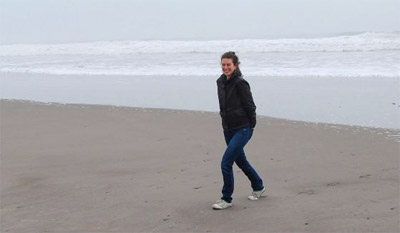Sarah Laskow is a freelance writer who has covered environmental issues for Grist, GOOD, and Newsweek.com, among others. Raised in New Jersey and educated at Yale where she studied literature, Sarah now lives across the river in Manhattan with her partner. She’s done extensive traveling in West Africa, Europe, and Central America. Sarah can be found on twitter as @slaskow.
Morgan Erickson-Davis: How did you get your start as a writer?
Sarah Laskow: I started writing nonfiction in college, when I worked for a student magazine that aspired to New Yorker-like grandeur. My first full time job in journalism was with the Center for Public Integrity, a nonprofit investigative journalism group. I worked with a bunch of great reporters, mostly refugees from alt-weeklies and news magazines, honed my own reporting skills, and eventually started writing my own stories.
Morgan Erickson-Davis: Did you study journalism in college? What inspired your interest in environmental issues?
Sarah Laskow: I didn’t! I just took one journalism class. I like environmental stories because they often involve politics, policy, and people, which makes for interesting tensions.
Morgan Erickson-Davis: What conservation issues most interest you?
 Sarah Laskow. |
Sarah Laskow: I’ve been writing a lot about the momentum towards clean and renewable energy, an area in which there’s a fascinating push and pull between traditional environmental concerns and the need to get the world off carbon. Nuclear and natural gas have health and environmental impacts that go along with them, but so do wind and solar power. I’m also interested in the way our conception of wilderness is changing: with climate change shifting the behavior of ecosystems everywhere, even places that aren’t managed by human beings aren’t wild in the same way as they once were.
Morgan Erickson-Davis: The negative impacts of renewable energy industries such as solar and wind aren’t widely broadcasted. What have you learned about that topic through your reporting?
Sarah Laskow: First of all, every energy source has some negative impacts. It takes a huge amount of energy to manufacture the silicon that goes into solar panels or the steel that goes into wind turbines, and there’s pollution associated with that production process. Wind turbines also require rare earth minerals, which have to be mined. The biggest issues are with land use: both solar and wind take up huge amounts of land, and some projects are being sited in pristine desert, where messing up the surface has both carbon impacts and impacts on the local ecosystems.
Morgan Erickson-Davis: How is our conception of wilderness is changing? Are there certain areas where this is happening more rapidly than in others? What does this mean in terms of conservation strategy?
Sarah Laskow: With climate change affecting ecosystems everywhere, no place is truly “wild.” People are also realizing that places we call, say, “old-growth forests” aren’t the same now as they were hundreds of years ago. Humans are impacting even the places we don’t touch. It means that we need to adjust our ideas of conservation: Should our goal be to keep everything exactly as it was, even if that means we need to keep close tabs on wild places and intervene when they start changing from what used to be?
Morgan Erickson-Davis: What would you say is the most important thing you’ve learned about environmental writing?
Sarah Laskow: There are great political stories in the environment beat, but writing about the environment also means digging into scientific research. It helps to be interested in both.
Morgan Erickson-Davis: Any advice for aspiring environmental writers?
Sarah Laskow: I think it’s the same advice I’d give to any aspiring writer: Don’t be afraid to ask about what you don’t know.
Sarah’s web site is sarahlaskow.com and her @slaskow.